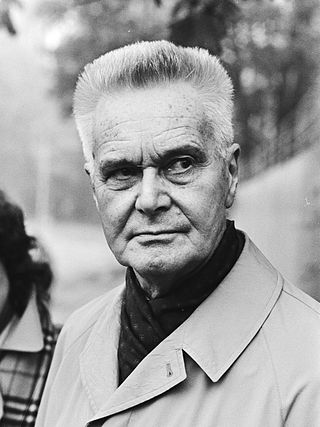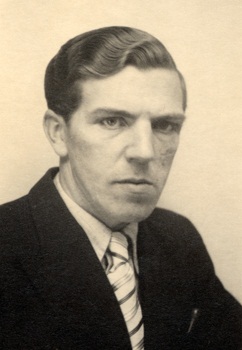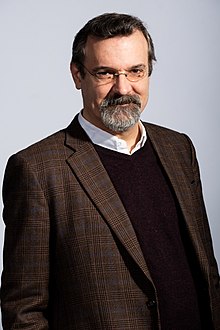
James Joseph Heckman is a Nobel Memorial in Economic Sciences Prize-winning American economist at the University of Chicago, where he is The Henry Schultz Distinguished Service Professor in Economics and the College; Professor at the Harris School of Public Policy; Director of the Center for the Economics of Human Development (CEHD); and Co-Director of Human Capital and Economic Opportunity (HCEO) Global Working Group. He is also Professor of Law at the Law School, a senior research fellow at the American Bar Foundation, and a research associate at the National Bureau of Economic Research.

Jan Tinbergen was a Dutch economist who was awarded the first Nobel Memorial Prize in Economic Sciences in 1969, which he shared with Ragnar Frisch for having developed and applied dynamic models for the analysis of economic processes. He is widely considered to be one of the most influential economists of the 20th century and one of the founding fathers of econometrics.

Ross McKitrick is a Canadian economist specializing in environmental economics and policy analysis. He is a professor of economics at the University of Guelph, and a senior fellow of the Fraser Institute.

Finn Erling Kydland is a Norwegian economist known for his contributions to business cycle theory. He is the Henley Professor of Economics at the University of California, Santa Barbara. He also holds the Richard P. Simmons Distinguished Professorship at the Tepper School of Business of Carnegie Mellon University, where he earned his PhD, and a part-time position at the Norwegian School of Economics (NHH). Kydland was a co-recipient of the 2004 Nobel Memorial Prize in Economics, with Edward C. Prescott, "for their contributions to dynamic macroeconomics: the time consistency of economic policy and the driving forces behind business cycles."

Trygve Magnus Haavelmo, born in Skedsmo, Norway, was an economist whose research interests centered on econometrics. He received the Nobel Memorial Prize in Economic Sciences in 1989.

Sir Angus Stewart Deaton is a British economist and academic. Deaton is currently a Senior Scholar and the Dwight D. Eisenhower Professor of Economics and International Affairs Emeritus at the Princeton School of Public and International Affairs and the Economics Department at Princeton University. His research focuses primarily on poverty, inequality, health, wellbeing, and economic development.
Hirsh Zvi Griliches was an economist at Harvard University. The works by Zvi Griliches mostly concerned the economics of technological change, including empirical studies of diffusion of innovations and the role of R & D, patents, and education. In 2023 he had 126 publication listed in Web of Science and a Hirsch index of 49, which places him into 2% of most productive economics professors in the USA.
The Mercatus Center is an American libertarian, free-market-oriented non-profit think tank. The Mercatus Center is located at the George Mason University campus, however the organization is privately funded and its employees are independent of the university. It is directed by Daniel M. Rothschild and its board is chaired by American economist Tyler Cowen. The Center works with policy experts, lobbyists, and government officials to connect academic learning with real-world practice. Taking its name from the Latin word for market, the center advocates free-market approaches to public policy. During the George W. Bush administration's campaign to reduce government regulation, The Wall Street Journal reported, "14 of the 23 rules the White House chose for its 'hit list' to eliminate or modify were Mercatus entries".
Peter Joseph Boettke is an American economist of the Austrian School. He is currently a professor of economics and philosophy at George Mason University; the BB&T Professor for the Study of Capitalism, vice president for research, and director of the F.A. Hayek Program for Advanced Study in Philosophy, Politics, and Economics at the Mercatus Center at GMU.

Christopher Albert Sims is an American econometrician and macroeconomist. He is currently the John J.F. Sherrerd '52 University Professor of Economics at Princeton University. Together with Thomas Sargent, he won the Nobel Memorial Prize in Economic Sciences in 2011. The award cited their "empirical research on cause and effect in the macroeconomy".
Paul Lewis Joskow is an American economist and professor. He became President of the Alfred P. Sloan Foundation on January 1, 2008. He is also the Elizabeth and James Killian Professor of Economics, Emeritus at MIT. He has served on the MIT faculty since 1972. From 1994 through 1998 he was Head of the MIT Department of Economics. From 1999 through 2007 he was the Director of the MIT Center for Energy and Environmental Policy Research. Since rejoining in 2018 from his 1988-2007 term, Professor Joskow is Research Associate on the National Bureau of Economic Research (NBER).

Daniel Bruce Klein is an American professor of economics at George Mason University and an Associate Fellow of the Swedish Ratio Institute. Much of his research examines the works of Adam Smith, public policy questions, libertarian political philosophy, and the sociology of academia. He is the chief editor of Econ Journal Watch.

Guido Wilhelmus Imbens is a Dutch-American economist whose research concerns econometrics and statistics. He holds the Applied Econometrics Professorship in Economics at the Stanford Graduate School of Business at Stanford University, where he has taught since 2012.
Michael D. Intriligator was an American economist at the University of California, Los Angeles, where he was Professor of Economics, Political Science, and Policy Studies, and Co-Director of the Jacob Marschak Interdisciplinary Colloquium on Mathematics in the Behavioral Sciences. In addition, he was a Senior Fellow at the Milken Institute in Santa Monica, a Senior Fellow of the Gorbachev Foundation of North America in Boston, a Foreign Member of the Russian Academy of Science, and a Fellow of the American Association for the Advancement of Science. He received his Ph.D. in Economics at MIT in 1963 and the same year joined the UCLA Department of Economics. He taught courses in economic theory, econometrics, mathematical economics, international relations, and health economics, and received several distinguished teaching awards.
Albert E. Rees was an American economist and noted author. An influential labor economist, Rees taught at Princeton University from 1966 to 1979, while also being an advisor to President Gerald Ford. He was also a former Provost of Princeton and former president of the Alfred P. Sloan Foundation. He was also the first head of the Council on Wage and Price Stability, a short-lived federal agency.

Jason Sorens is a Senior Research faculty member for the American Institute for Economic Research also known as, AIER. Previously, Sorens served as director of the Center for Ethics in Society at St. Anselm College and prior to his work with St. Anselm, Sorens was a lecturer in the department of government at Dartmouth College. He has been an affiliated scholar with the Mercatus Center at George Mason University since 2008. His primary research interests include fiscal federalism, public policy in federal systems, secessionism, and ethnic politics. Sorens received his B.A. in economics and philosophy, with honors, from Washington and Lee University and his PhD in political science from Yale University. He is the founder of the Free State Project and president of Ethics & Economics Education of New England, an effort to boost ethical and economic literacy in New England through programs for high schoolers, opinion leaders, and the general public.

The Princeton University Department of Economics is an academic department of Princeton University, an Ivy League institution in Princeton, New Jersey. The department is one of the most premier institutions for the study of economics. It offers undergraduate A.B. degrees as well as graduate Ph.D. degrees. It is considered one of the "big five" schools in the field along with the faculties at the University of Chicago, Harvard University, Stanford University, and MIT. According to the 2018 U.S. News & World Report, the department ranks as joint No. 1 in the field of economics.
Eleonora Patacchini is an economist specializing in applied economics and applied statistics who grew up in Italy with her mother who was also a professor. She is a professor and associate department chair at Cornell University in the Department of Economics. Her research focuses on the empirical analysis of behavioral models of strategic interactions for decision making. Patacchini is an associate editor at Journal of Urban Economics and Statistical Methods & Applications. She is a columnist at the VOX CEPR Policy Portal where research-based policy analysis and commentary from leading economists are published frequently. She is also a co-editor of E-journal Economics and associate editor of the Journal of Urban Economics.
Kiminori Matsuyama is a Japanese economist. He is a professor of economics at Northwestern University and, since December 2018, the chief scientific adviser of the Tokyo Foundation for Policy Research. He is also international senior fellow at the Canon Institute of Global Studies. He was awarded the Nakahara Prize from the Japanese Economic Association in 1996 and was elected a fellow of the Econometric Society in 1999, and a fellow of the Society for the Advancement of Economic Theory in 2011.
The 2021 Nobel Memorial Prize in Economic Sciences was divided one half awarded to the American-Canadian David Card "for his empirical contributions to labour economics", the other half jointly to Israeli-American Joshua Angrist and Dutch-American Guido W. Imbens "for their methodological contributions to the analysis of causal relationships." The Nobel Committee stated their reason behind the decision, saying:
"This year's Laureates – David Card, Joshua Angrist and Guido Imbens – have shown that natural experiments can be used to answer central questions for society, such as how minimum wages and immigration affect the labour market. They have also clarified exactly which conclusions about cause and effect can be drawn using this research approach. Together, they have revolutionised empirical research in the economic sciences."











